Composting
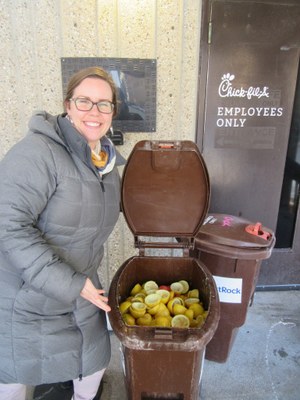 Sustainability requires us to not only reduce waste, but to re-conceptualize waste as resource and to seek ways to creatively 'close the loop'. UofL is achieving this most directly in the way we handle our organic wastes. Most food waste from UofL Dining facilities is composted off-site via subcontract through WestRock Recycling, but there are many other smaller local organic waste streams that you can help us turn into valuable organic fertilizer!
Sustainability requires us to not only reduce waste, but to re-conceptualize waste as resource and to seek ways to creatively 'close the loop'. UofL is achieving this most directly in the way we handle our organic wastes. Most food waste from UofL Dining facilities is composted off-site via subcontract through WestRock Recycling, but there are many other smaller local organic waste streams that you can help us turn into valuable organic fertilizer!
On-Site Community Composting
UofL began on-site composting of pre-consumer, plant-based food waste from its Belknap campus dining facilities in July 2010. The composting program involves volunteer students, staff and community members. It was designed to be educational and coordinated with the campus Garden Commons project which needs both a steady supply of compost to grow organically and a way to compost garden and food wastes on campus. Read more about the project here. Follow us on ![]()
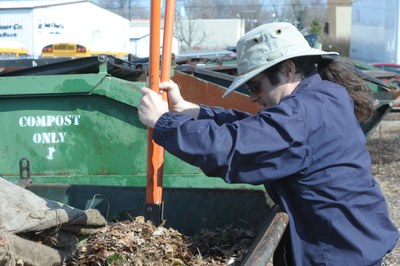
Kentucky Composting Council honors UofL's Brian Barnes with the 2025 Jean Bonhotal Award (UofL Sustainability News, Oct. 2025)Interview: UofL's Sean Raph, Louisville Compost Co-op (Sustainability Now!, Forward Radio 106.5fm, Nov. 16, 2020)
The project continues today as a service opportunity associated with UofL's EcoReps Program and has evolved into a community composting partnership with our neighbors. At our peak in 2016, we were composting about 4230 pounds/week of food wastes with the power of human labor!
- We need volunteers every Sunday from noon-2pm at our composting site, which is at the north end of UofL's Grounds Lot at 240 E. Bloom St. just one block north of Cardinal Blvd. between Brook and Floyd Streets (map here). Dress to get dirty. Tools provided. All participants are welcome to haul home some rich UofL compost for gardening projects in your own containers/vehicle. This is a weekly service opportunity throughout the year.
- Donations of your kitchen scraps are always welcome at the site - just drop them off in the indicated bin 24/7 and come on Sunday between noon and 2pm if you have any questions.
- To get involved in the partnership and help keep the cycle of life thriving, contact Project Director, Brian Barnes, 502-338-1338.
- Follow us on

Compost Your Own!
There are several places at UofL where you can participate directly in making rich, organic fertilizer for use right here on campus!
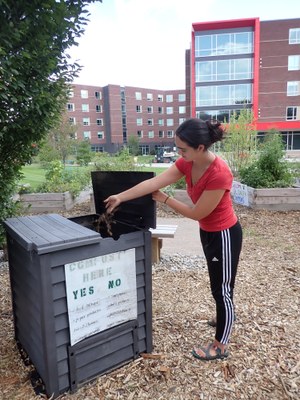
A Beginner’s Guide to Composting at Home
UofL is registered on the ShareWaste App, connecting those who want to compost with those who will take organics.
Decompose.co - a simple guide to composting
Helpful Tips To Make Great Compost
- You can compost your own food scraps on campus in outdoor compost bins at the:
- UofL Community Composting Project site at the north end of UofL's Grounds Lot at 240 E. Bloom St. just one block north of Cardinal Blvd. between Brook and Floyd Streets (map here).
- Garden Commons (northeast of Baptist Campus Ministry)
- Urban & Public Affairs garden at 426 W. Bloom St. (behind Bettie Johnson Hall).
- UofL's LEED Gold certified Center for Predictive Medicine on the Shelby campus features a "Birthday" Garden with a compost bin.
- Start Composting with a Free Compost Caddy! UofL is now offering a new free subscription service for anyone on campus who wants a compost caddy for their dorm, apartment, or office to help you collect compostables. You'll be responsible for dumping your bin at one of our sites weekly and rinsing it out. If you'd like a compost caddy, complete our online request form today!
- Special indoor collection bins for plant-based materials picked-up for composting are available at:
- Clinical & Translational Research Building at HSC (all 10 break rooms)
- Humanities 313 (Philosophy Department)
- Strickler 310 (Communication Department)
- Urban & Public Affairs 112 (1st floor kitchen)
* If you'd like a compost bucket for your department and have a volunteer to set it out weekly, we're happy to come pick it up for you! Just contact Brian Barnes at 502-338-1338. - No meat, bones, or dairy products are accepted in any of these on-site composting bins. This helps reduce problems with odors and vermin.
- Please contribute any plant-based wastes such as food scraps, paper towels, paper plates/cups/sleeves, napkins, tissues, newspaper, cardboard/pizza boxes (please tear up large pieces), coffee grounds, tea bags, fruit peels, vegetable scraps, bread & baked goods, leaves, etc.
- We seek volunteers willing to set up a compost bucket (with sealed lid to reduce odors and pest problems) in their campus kitchen or break-room who can regularly bring the bucket over to the Garden Commons to be emptied and rinsed. Contact: Brian Barnes, EcoReps Director: 502-338-1338.
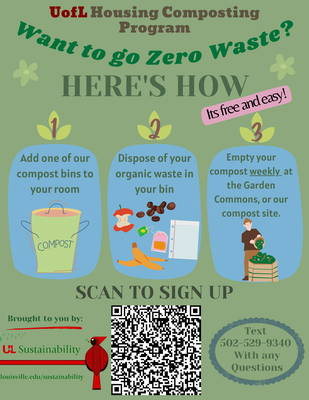 Start Composting with a Free Compost Caddy!
Start Composting with a Free Compost Caddy!
UofL offers composting at our Campus Gardens (next to the Baptist Center & behind Bettie Johnson Hall) and at our Community Composting Project (just past Taco Bell at 250 E. Bloom St.). At these locations, you can drop off any food scraps, paper/cardboard products, and other organic wastes for composting anytime 24/7! Composting keeps useful material out of the landfill (where it will convert into methane, a super-charged greenhouse gas) and helps us grow new food in our gardens! We're now offering a new free subscription service for anyone on campus who wants a compost caddy for their dorm, apartment, or office to help you collect compostables. You'll be responsible for dumping your bin at one of our sites weekly and rinsing it out. If you'd like a compost caddy, complete our online request form today!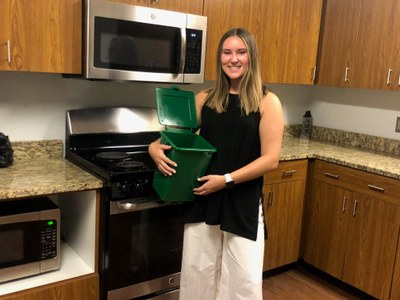
- Community Partners: Louisville Compost Co-op, Angel’s Envy Distillery, Shelby Park Community Garden, Solid Light, Louisville Metro Government (Office of Sustainability), Copper & Kings Distillery, Trees Louisville, Blue Dog Bakery, Lush Cosmetics, Best Buy, Maeda Salon, Clean Air Lawn Care Louisville, Inverness Condominiums, 1400 Willow Condominiums, Nur Islamic School, Wells Made Co. Past partners have also included: Blackacre State Nature Preserve, Heine Bros Coffee, GenScape, Naive Restaurant, WaterStep, UofL Garden Commons, Fern Creek High School, UofL Urban Planning and Public Affairs Horticulture Zone, WestRock Recycling, UofL Dining (including Starbucks), Brown-Forman, Foodworks Louisville, and dozens of anonymous individual community partners. In the past we have also processed organic wastes from UofL Campus Housing.
-
UofL Departments or Units Involved: Office of the Provost (Sustainability); Sustainability Council; CTR building; Fine Arts;
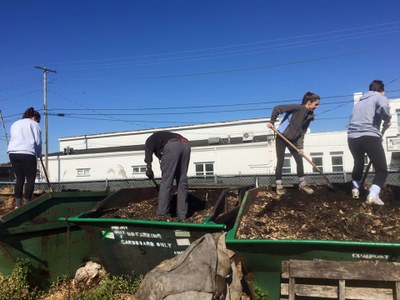 Mathematics; Philosophy; Urban and Public Affairs; Theatre Arts; Physical Plant; UofL Dining; Athletics; Eco-Reps Program; UofL Engineers Without Borders.
Mathematics; Philosophy; Urban and Public Affairs; Theatre Arts; Physical Plant; UofL Dining; Athletics; Eco-Reps Program; UofL Engineers Without Borders. - Project History: Beginning in December of 2009, Brian Barnes, a UofL Philosophy instructor, conceived and built a food waste composting facility at UofL. Barnes noticed a pile of decommissioned campus dumpsters from UofL's old recycling system and worked with the university to repurpose the dumpsters into large compost bins for campus food wastes. Since beginning operation in July 2010, the UofL Community Composting Project has diverted hundreds of tons of pre-consumer food waste and coffee grounds from landfills into the production of rich, fertile soil that enhances not only the UofL Garden Commons (our initial partner), but many other gardens, orchards, and landscape projects around the university and the city. In March 2011, the project was profiled in UofL Today: Food composting comes to campus. Starting in 2011, all compostables were transported to the site in surplus UofL Physical Plant vans. Today we use a Physical Plant pickup truck after hours. In November 2014, we began partnering with Heine Bros Coffee to gather coffee grounds and other compostables from the 17 Heine Brothers Coffee locations around Metro Louisville, serving organic, fairly trade, locally-roasted coffee. In 2014-15, we piloted an expansion into campus residence hall collection of food wastes in both Miller Hall and Louisville Hall. That pilot demonstrated the value of the service to Campus Housing which organized to expand the pilot to all residence halls in 2017. In January 2017, we rolled-out weekly collection of organics in all Belknap Campus Housing facilities for on-site composting but the quantity of waste captured did not justify continued collections.
> UofL Green Scene: Composters Wanted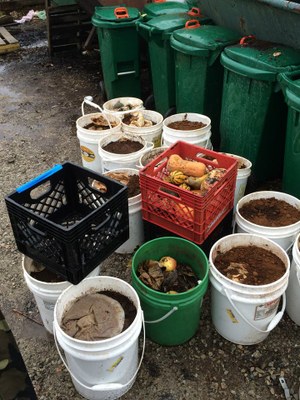
> UofL's Composting Program is featured:
- On page 27 of the Compendium of Organics Recovery Programs at Colleges and Universities, produced for EPA Region 4 by UofL's Center for Environmental Policy and Management (2015)
- On page 52 of the Highfields Center for Composting publication Growing Local Fertility: A Guide to Community Composting (2014)
> A Lesson in Valuing Food: Area Schools Take Steps to Reduce Food Waste (Edible Louisville, Oct/Nov 2016)
> The dirt on the dirt: organic composting at the University of Louisville (Louisville Cardinal)
> Video: UofL Trash Mob Flash Mob!
-
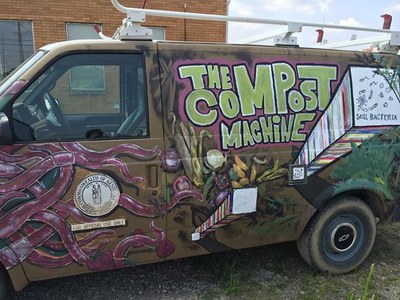 How It Works: The Project picks up organic wastes from its community partners once or twice weekly. These donations of primarily food waste and coffee grounds are mixed on-site at UofL’s Floyd Street Mulching Facility. Volunteers layer the waste in reclaimed dumpsters, along with mulched yard waste from community partners, like leaves and tree limbs. Periodically, full dumpsters of waste are aerated by volunteers climbing into the dumpsters and digging holes. Hand tools are used in all aspects of the operation. Composting requires water, and we have modified the dumpsters to maximize precipitation capture; we also use a hose to occasionally water the bins. Volunteers maintain a small herb and vegetable garden, along with a berry patch, between and among our dumpsters.
How It Works: The Project picks up organic wastes from its community partners once or twice weekly. These donations of primarily food waste and coffee grounds are mixed on-site at UofL’s Floyd Street Mulching Facility. Volunteers layer the waste in reclaimed dumpsters, along with mulched yard waste from community partners, like leaves and tree limbs. Periodically, full dumpsters of waste are aerated by volunteers climbing into the dumpsters and digging holes. Hand tools are used in all aspects of the operation. Composting requires water, and we have modified the dumpsters to maximize precipitation capture; we also use a hose to occasionally water the bins. Volunteers maintain a small herb and vegetable garden, along with a berry patch, between and among our dumpsters. -
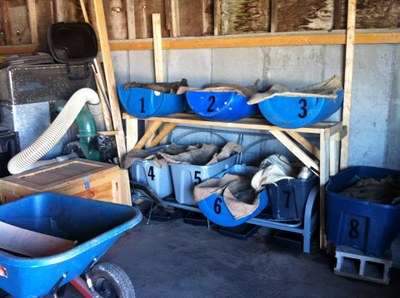 How The Compost Is Used: Much of the compost is donated to community partners, but a portion is used to feed our worm population. Running the finished compost through a worm’s digestive tract results in vermicompost, which is nature’s super soil. We maintain a population of red wiggler manure worms (eisenia foetida) for creating the vermicompost, which we harvest periodically to donate to our community partners and university gardens. The worms live and work in modified plastic flavoring barrels provided to the project by Brown-Forman Distillery.
How The Compost Is Used: Much of the compost is donated to community partners, but a portion is used to feed our worm population. Running the finished compost through a worm’s digestive tract results in vermicompost, which is nature’s super soil. We maintain a population of red wiggler manure worms (eisenia foetida) for creating the vermicompost, which we harvest periodically to donate to our community partners and university gardens. The worms live and work in modified plastic flavoring barrels provided to the project by Brown-Forman Distillery. -
Spin-off Projects: We are always looking for new sustainability project ideas to experiment with on-site!
-
Mushroom Growing: In 2022-23, a student with an incredible passion for
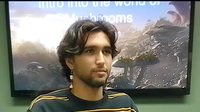 mycology and mushroom-growing, Leo Mellen, began experimenting with mushroom cultivation on campus. He established a mushroom-growing tent at first in the worm room at the UofL Community Composting Project, but in November 2023, the indoor mushroom farm was relocated to the basement of Urban & Public Affairs (426 W. Bloom St., west of Bettie Johnson Hall), to compliment the other sustainable urban agriculture projects at at the UPA Horticulture Zone. During UofL Sustainability Week, on October 20, 2023, Leo facilitated an EcoReps Lunch & Learn Workshop on Mushrooms for people who are interested in learning more about the bizarre and magical world of mycology. The workshop explored the ecology and life cycle of fungi; how to cultivate mushrooms; medicinal uses of mushrooms; and research being done with mushrooms. Watch recording.
mycology and mushroom-growing, Leo Mellen, began experimenting with mushroom cultivation on campus. He established a mushroom-growing tent at first in the worm room at the UofL Community Composting Project, but in November 2023, the indoor mushroom farm was relocated to the basement of Urban & Public Affairs (426 W. Bloom St., west of Bettie Johnson Hall), to compliment the other sustainable urban agriculture projects at at the UPA Horticulture Zone. During UofL Sustainability Week, on October 20, 2023, Leo facilitated an EcoReps Lunch & Learn Workshop on Mushrooms for people who are interested in learning more about the bizarre and magical world of mycology. The workshop explored the ecology and life cycle of fungi; how to cultivate mushrooms; medicinal uses of mushrooms; and research being done with mushrooms. Watch recording. -
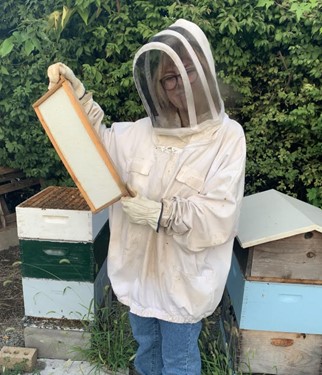 Beekeeping: In 2020-21, with funding from SGA, the UofL Sustainability Council acquired beekeeping equipment and two hives of bees from a neighbor in Schnitzelburg. This allowed us to establish an educational apiary on campus. In its first couple years, the apiary was located at the site of the Community Composting Project. In 2023, the apiary was relocated to a more accessible and safer location that is even better for the bees, at the UPA Horticulture Zone, in the central courtyard, just to the left of the rear entrance to Urban & Public Affairs (426 W. Bloom St., west of Bettie Johnson Hall). A student Sustainability Intern, the Campus Apiarist, is in charge of maintaining the apiary and conducting outreach to the campus community (using our observation hive), including managing the uoflhoneybees Instagram account.
Beekeeping: In 2020-21, with funding from SGA, the UofL Sustainability Council acquired beekeeping equipment and two hives of bees from a neighbor in Schnitzelburg. This allowed us to establish an educational apiary on campus. In its first couple years, the apiary was located at the site of the Community Composting Project. In 2023, the apiary was relocated to a more accessible and safer location that is even better for the bees, at the UPA Horticulture Zone, in the central courtyard, just to the left of the rear entrance to Urban & Public Affairs (426 W. Bloom St., west of Bettie Johnson Hall). A student Sustainability Intern, the Campus Apiarist, is in charge of maintaining the apiary and conducting outreach to the campus community (using our observation hive), including managing the uoflhoneybees Instagram account. -
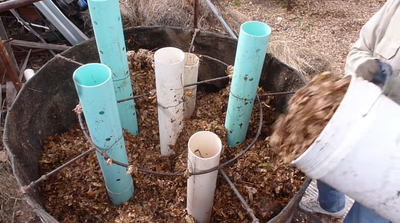 Fall 2020: Experimenting with Johnson-Su Composting Bioreactors and liquid application on campus turf
Fall 2020: Experimenting with Johnson-Su Composting Bioreactors and liquid application on campus turf
UofL Groundskeeper Ryan Lewis is collaborating with undergraduate Composting Intern, Josh Cagle, to experiment with the Johnson-Su Composting Bioreactor design prototyped by researchers at New Mexico State University. They are constructing six bioreactors on campus to explore more efficient methods for composting leaves in the fall using this passive, no-turn system that produces a superior, microbially-diverse and fungal-dominant compost. This compost can be used to restore biological functionality to soils, so we will be examining the soil quality impacts of applying the liquid organic compost products on grass turf at Belknap campus. The idea is to study the impacts on factors such as soil bulk density and fertility of switching from chemical fertilizer to compost as a pilot project on an out-of-the-way lawn suffering from soil compaction. If the project proves successful, the Grounds crew will consider expanding the practice to other areas of campus in order to improve soil quality, reduce nitrogen pollution and save money by moving away from chemical fertilizers. - Back in 2014, the project began experimenting with mycoculture and aquaponics, as well as improving its rainwater capture systems.
- The composting project has also experimented with growing a variety of food crops in small garden areas on site.
-
Mushroom Growing: In 2022-23, a student with an incredible passion for
- Education: Due to our strong educational orientation, one of the goals of the project is that it always be accomplished in such a way that any or all of its systems could be replicated by other communities, or even elsewhere in our own community. We also strive for a negligible carbon footprint. Learn how you can do this!
-
Sample Project Statistics:
Number of Students Involved (2012-2013): 500
Number of Staff Involved (2012-2013): 8
Number of Faculty Involved (2012-2013): 1
Number of non-UofL volunteers Involved (2012-2013): 25
Grant Funding (overall since project began in 2009): $0
The UofL Sustainability Council provided Brian Barnes a stipend for administrative costs since 2012-2017 and this funding resumed July 2019. The project also receives financial support as a result of the partnership with the Louisville Composting Co-op, Heine Bros Coffee, GenScape, and other local businesses and organizations that we collect organic wastes from. Donations of funds and tools are always welcome to help us keep this operation going. Contact: Brian Barnes, 502-338-1338.
Tons of Food Waste Composted On-site: 2010: 20 tons. 2011: 20 tons. 2012: 13 tons. 2013: 25 tons. 2014: 33 tons. 2015: 74 tons. 2016: 110 tons. 2017: 81 tons. 2018: 44 tons. 2019: 71 tons. 2020: 17.5 tons (plus 127 tons at Blackacre). 2021: 36 tons. 2022: 27 tons (plus 105 tons at Blackacre).
-
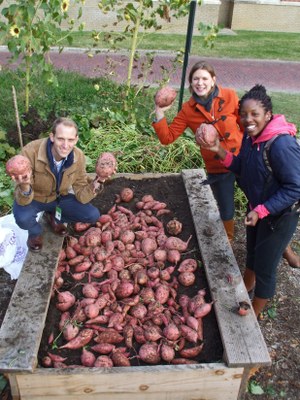 Impact on UofL: UofL has become known for its sustainability initiatives. Closing the loop on food waste on campus has been a powerful example of what is possible with reused resources, imagination, volunteers, campus partnerships, and sustainability initiatives. It is also the case that this project has been accomplished with very little funding, which has also helped it become a model. The project provides high quality soil to planting projects around campus, including two community gardens and a wildflower garden. This project has evolved to include more on-campus and off-campus opportunities for students to engage and learn about sustainability in a very hands-on approach. Beginning in 2011, faculty, staff and students were given the opportunity to compost their own food scraps at the Garden Commons located on campus. In March 2012, inspired by these efforts, UofL established a contract for collection and pick-up of all food wastes from UofL dining facilities. The Community Composting Project now operates with UofL Dining as a much smaller partner, and we are always seeking new sources of waste to reclaim from the landfill. For example, in addition to the Quills and Ekstrom Library coffee shops, we piloted an organics collection from select UofL residence halls on campus in 2014-15. That pilot has spawned plans for organics collection in all Campus Housing halls beginning in 2017. We have also implemented a partnership with UofL Athletics to collect food scraps from Athletics facilities along Floyd Street. All compost and vermicompost is donated to community partners; there is no sales structure in place to support this project.
Impact on UofL: UofL has become known for its sustainability initiatives. Closing the loop on food waste on campus has been a powerful example of what is possible with reused resources, imagination, volunteers, campus partnerships, and sustainability initiatives. It is also the case that this project has been accomplished with very little funding, which has also helped it become a model. The project provides high quality soil to planting projects around campus, including two community gardens and a wildflower garden. This project has evolved to include more on-campus and off-campus opportunities for students to engage and learn about sustainability in a very hands-on approach. Beginning in 2011, faculty, staff and students were given the opportunity to compost their own food scraps at the Garden Commons located on campus. In March 2012, inspired by these efforts, UofL established a contract for collection and pick-up of all food wastes from UofL dining facilities. The Community Composting Project now operates with UofL Dining as a much smaller partner, and we are always seeking new sources of waste to reclaim from the landfill. For example, in addition to the Quills and Ekstrom Library coffee shops, we piloted an organics collection from select UofL residence halls on campus in 2014-15. That pilot has spawned plans for organics collection in all Campus Housing halls beginning in 2017. We have also implemented a partnership with UofL Athletics to collect food scraps from Athletics facilities along Floyd Street. All compost and vermicompost is donated to community partners; there is no sales structure in place to support this project. -
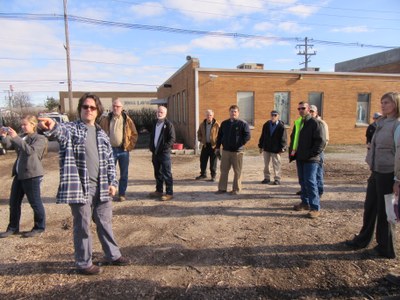 Outreach: The project has caused UofL to receive media coverage, not only from The Louisville Cardinal and UofL Today, but from WHAS-11 and other off-campus news outlets. Coverage such as this has aided the project into evolving into the multifaceted composting initiative that it is today involving many community partners. This project is also the foundation service project for supporting the Garden Commons and the Eco-Reps programs on campus. Recently, the Project was contacted by The Composting for Community Project at The Institute for Self-Reliance in Washington, DC, to provide information about its operations as part of a national education program. That document can be found here: Growing Local Fertility: A Guide to Community Composting. Information about UofL’s program was also featured at the October 2013 Cultivating Community Composting conference in Columbus, Ohio.
Outreach: The project has caused UofL to receive media coverage, not only from The Louisville Cardinal and UofL Today, but from WHAS-11 and other off-campus news outlets. Coverage such as this has aided the project into evolving into the multifaceted composting initiative that it is today involving many community partners. This project is also the foundation service project for supporting the Garden Commons and the Eco-Reps programs on campus. Recently, the Project was contacted by The Composting for Community Project at The Institute for Self-Reliance in Washington, DC, to provide information about its operations as part of a national education program. That document can be found here: Growing Local Fertility: A Guide to Community Composting. Information about UofL’s program was also featured at the October 2013 Cultivating Community Composting conference in Columbus, Ohio.
We Need Compost! (featuring many of our friends in the Louisville-area composting scene!).
- Student Involvement: Student participation is robust, though episodic. Students in Business Ethics classes study this organization as a sustainable community model, and they contribute their labor as part of their research; we are involved with SOUL and the Office of Student Involvement, which sends volunteer groups our way at least annually; the project serves as a model to be studied for Barnes’ senior seminar in sustainability and social justice at Bellarmine University; we are becoming known in the community as a composting partner (as one example, The Louisville Zoo contacted us about a donation of compostables from an event); and we receive contact weekly from groups and individuals interested in learning more about what we do. One volunteer, Angie Carlson, made a huge splash, in part, for work with the project, featured in Sierra magazine.
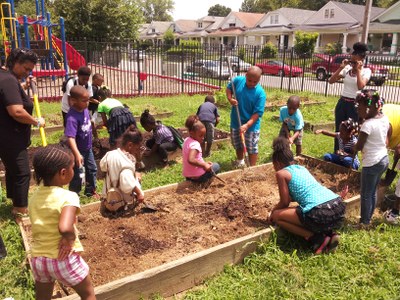
- Impact on Community: The UofL Composting Project provides a working model of an environmentally-sound and sustainable urban composting system. In addition to keeping considerable quantities of trash out of landfills, the project provides soil to community partners for gardening, growing of food, and educational events. The project brings together diverse community partners around the topics of healthy soil, good food, and learning the truth about our trash. The Community Composting Project is becoming known around Metro and the US as a model of sustainable action with low cost, low carbon footprint, and high impact. We have given soil to dozens of community gardens, non-profits, and individuals around the Metro community during our operation. The project is a unique point of innovative convergence with other sustainability groups like WaterStep and Engineers Without Borders.
-
Scholarship resulting from this project, includes presentations at:
• Association for the Advancement of Sustainability in Higher Education (AASHE) Conference 2013, 2015, 2016, 2019
• Bluegrass Bioneers Conference 2011, 2012
• Healthy Foods, Local Farms Conference 2010, 2011
• Campus Community Partnerships for Sustainability Conference 2010, 2011
• Numerous presentations/tours for regional universities, including University of Kentucky, Indiana University, Western Kentucky University, etc.
• Subject of UofL Eco-Reps video training series
Large-scale Off-Site Composting
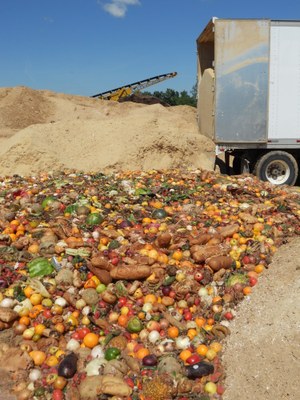
In an effort to scale-up food waste composting efforts, in March 2012, UofL established a new sub-contract for collection and pick-up of all food wastes from UofL dining facilities as well as our Early Learning Campus. This contract is now managed by WestRock Recycling. This allows us to compost both pre- and post-consumer food wastes, as well as meats, bones, and dairy-products, all of which are now collected and composted into organic soil amendments by Smith Creek of Borden, Indiana, about 20 miles northwest of campus. In 2019 alone, this system kept 463,420 pounds of food waste out of the landfill!
Animal Bedding
UofL's research facilities generate as much as 450 tons/year of waste animal bedding. This material used to be landfilled, but in February 2012, UofL began sending this waste stream to off-site composting facilities, where it is turned into a beneficial soil amendment. Today it is collected by Waste Management and composted at the Outer Loop Recycling & Disposal Facility, just 8 miles from campus. The finished compost is used to amend soils for ecological restoration at the Outer Loop RDF Wildlife Habitat which has been certified by the Wildlife Habitat Council. In 2022, we composted 226 tons of animal bedding from UofL facilities!
Yard Waste
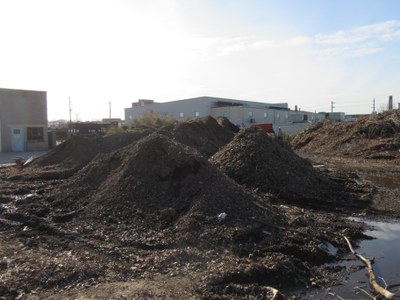
The University of Louisville Grounds Maintenance Department utilizes selected green waste created from the care of the lawns, landscape and trees on Belknap campus to create compost/mulch on site. This includes chipped/shredded tree limbs, shrub trimmings and leaves. These materials are "tub ground" once or twice per year for mixing and particle size reduction. They are then piled based on their age and turned regularly for aeration. No artificial irrigation is used for the operation. After the materials have decomposed to a satisfactory state, they are used as mulch in campus landscaping or given to the university community.



